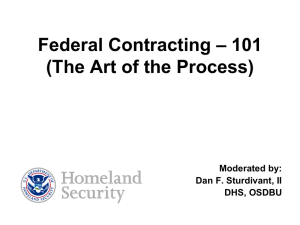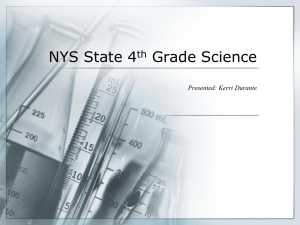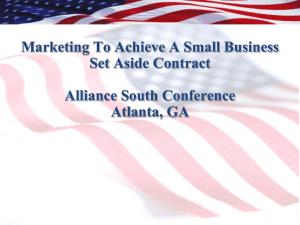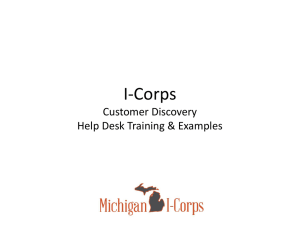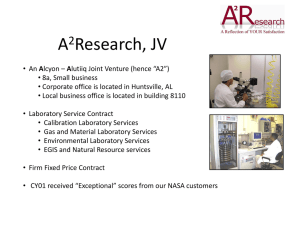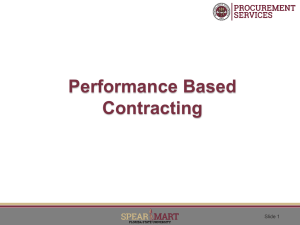2014-04-10 NCMA_SB - National Contract Management
advertisement
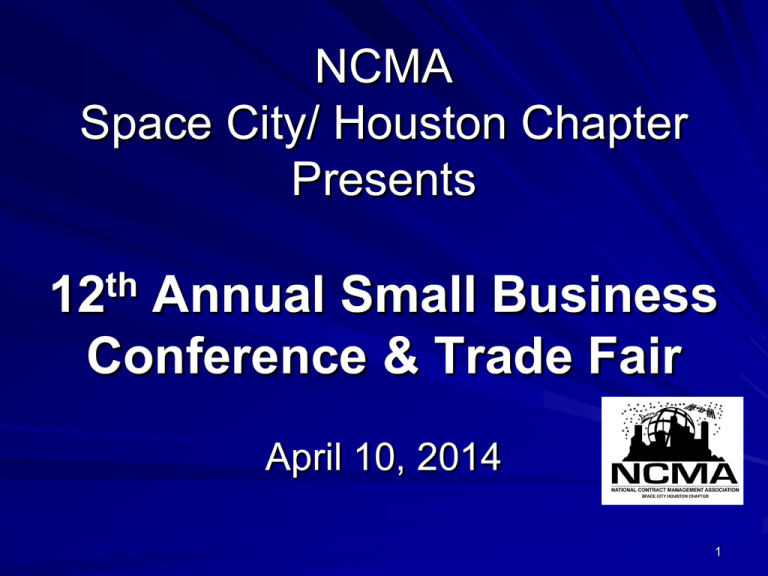
NCMA Space City/ Houston Chapter Presents th 12 Annual Small Business Conference & Trade Fair April 10, 2014 1 Agenda 8:30 a.m. – 9:00 a.m. – Welcome/Conference Overview Kelly Rubio, NASA Penny L. White, The Boeing Company – NCMA Welcome Delene Sedillo, President, NCMA Space City Houston Chapter 2 Agenda Welcome/Conference Overview Kelly Rubio, NASA Penny L. White, The Boeing Company 3 Committee Penny White, Co-Chair (Boeing) Kelly Rubio, Co-Chair (NASA) Jannette Bolden (NASA) Toni Hall (Boeing) Jack Harrison (QTS, Inc.) Christie Pillar (USA) Luz Wood (USA) 4 Sponsors Level I Jacobs Technology Lockheed Martin Space Systems The Boeing Company United Space Alliance Wyle Integrated Science & Engineering 5 Sponsors Level II LZ Technology, Inc. UTC Aerospace Systems MEI Technologies, Inc. Anadarko Industries, LLC Wichita Tribal Enterprises, LLC MRI Technologies PAE Applied Technologies, LLC 6 Sponsors Level III SGT, Inc. QTS, Inc. Logical Innovations, Inc. Space X Dyn Corp International JesTech Houston Precision Fasteners es2 technologies, inc. 7 Participating Resource Organizations City of Houston Houston Minority Supplier Development Council (HMSDC) National Aeronautics and Space Administration (NASA) National Contract Management Association (NCMA) Port of Houston Authority Space Alliance Technology Outreach Program (SATOP) 8 Participating Resource Organizations Small Business Administration (SBA) U.S. Army Corps of Engineers U of H Procurement Technical Assistance Center (PTAC) Women’s Business Enterprise Alliance (WBEA) METRO 9 Door Prize Donations University of Houston PTAC Houston Minority Supplier Development Council (HMSDC) SGT, Inc. United Space Alliance LZ Technology, Inc. Barrios Technology Logical Innovations, Inc. Wyle Integrated Science & Engineering MEI Technologies 10 Door Prize Donations Space X Jacobs Technology QTS The Boeing Company Jes Tech Dyn Corp International Anadarko Industries, LLC Wichita Tribal Enterprises, LLC MRI Technologies Houston Precision Fasteners 11 Agenda NCMA Welcome Delene Sedillo, President NCMA Space City Houston Chapter 12 Chapter Officers for 2014-2015 President – Delene Sedillo NASA-JSC Vice President– Leon Beard Boeing Secretary- Mike Hamm es2 technologies, inc. Treasurer- Robert Kolb NASA-JSC Membership – Miyoshi Thompson NASA-JSC VP/Education- Michele Wilkinson VP/Programs- Scott Stephens Jacobs Technology NASA-JSC 13 Chapter Events National Education Seminar Date: May 15, 2014 Topic: Risk Management for Complex U.S. Government Contracts and Projects Location: Gilruth Speaker: Mr. Mark Lumer and Ms. Shene’ Commodore 14 Agenda 9:00 a.m. – 10:00 a.m. “JSC Procurement Initiatives” JSC Acquisition Forecast: Kelly Rubio Strategic Acquisition Forecast: Brad Niese E-Contracting Initiatives: Christina Hibbs 10:00 a.m. – 10:15 a.m. Networking Break 15 Acquisition Forecast NASA Johnson Space Center Kelly L. Rubio Small Business Specialist Industry Assistance Office April 10, 2014 Acquisition Forecast NASA/JSC publically posts an annual Acquisition Forecast on October 1st of each year. The JSC Acquisition Forecast can be viewed at: http://procurement.jsc.nasa.gov/geninfo.html The JSC Small Business website can be viewed at: http://procurement.jsc.nasa.gov/smbus.html Current Significant Acquisitions at JSC can be viewed at: http://procurement.jsc.nasa.gov/ 17 Acquisition Forecast For more information contact the JSC Industry Assistance Office: Small Business Specialists: Charles T. Williams: charles.t.williams@nasa.gov 281-483-5933 Kelly L. Rubio: kelly.l.rubio@nasa.gov 281-244-7890 18 NASA Johnson Space Center Strategic Acquisition Forecast Evaluation (SAFE) Brad Niese JSC Office of Procurement April 2014 19 19 SAFE Overview • Strategic Acquisition Forecast Evaluation • JSC 2.0 Initiative – Advance Strategic Goal #3 “Excel in Leadership, Management and Innovation” – Using Strategy 3.1, Lead through innovative technical and business management practices • Objectives – Efficient & effective manner to acquire goods & services to meet goals/mission of the center and programs – Longer-term, strategic acquisition outlook with an integrated center-wide focus with goals to optimize interdependencies and reduce redundancies – Leverage flexibilities to develop integrated business and acquisition solutions 20 SAFE Process 21 SAFE Team Activities • Portfolio categorization – Categorizing contracts by type of supply or service being acquired, Center or Program support, recurring or nonrecurring requirement, periods of performance, socioeconomic categories, etc. • Deep Dive Analysis & Recommendations – Looking for synergies across center contract statements of work – Focusing recommendations on contracts in time horizon to influence future decisions – Socioeconomic focus with recommendations • Acquisition Dashboard – Electronic tool to integrate pertinent contract data in a single location – Enables & reinforces SAFE concepts through information availability to acquisition stakeholders (internal and external) – Will enable more complete and longer acquisition forecasting in future 22 SAFE Benefits • Will enable NASA to… – Forecast future opportunities further into the future (> 1 year) – Enhanced integration of socioeconomic goals with acquisition strategy • Will enable small businesses… – More time to establish partnerships and teaming arrangements – More insight and time to make bid strategy decisions 23 Electronic Contracting Initiatives and their Impacts on the Small Business Community NCMA Small Business Conference April 10, 2014 Christina A. Hibbs Contracting Officer Office of Procurement NASA Johnson Space Center What is the Electronic Contracting Initiative? JSC’s Office of Procurement has created an Electronic Contracting Team to explore and initiate electronic procurement processes The team’s goal in implementing these electronic processes is to ensure cost and time savings for both the Government and Contractors, smoother workflows, and a reduced carbon footprint for contract actions E-Processes Implementation Current Processes Being Implemented: Electronic Purchase Orders Electronic Data Requirements Deliverable (DRD) submission Electronic invoice submission and processing Electronic signatures (on certain documents) Upcoming E-Processes: Electronic proposal submissions Expected Benefits to the Small Business Community Cost Savings Elimination of the requirement to print and mail hard copy letters and certain deliverables Lower bid and proposal costs on acquisitions competed electronically Expected Benefits to the Small Business Community Time Savings Less time spent printing and compiling hard copy documents Elimination of hand delivery for identified items Quicker turnaround time on many actions can be achieved on both the Government and Contractor sides Expected Benefits to the Small Business Community Other Benefits Smoother workflow processes as there will be less administrative burden associated with preparing and delivering hard copy proposals, invoices, and deliverables. Overall reduced carbon footprint and increased environmental responsibility Questions or Comments? Agenda 10:00 a.m. – 10:15 a.m. Networking Break 31 Agenda 10:15 a.m. – 11:00 a.m. Small Business Update Valerie Coleman, Procurement Center/ Commercial Market Representative, U.S. Small Business Administration 32 SBA Updates Valerie Coleman PCR/CMR Office of Government Contracting U. S. Small Business Administration Administrator Maria Contreras-Sweet Sworn in – April 7, 2014 NAICS & Size Standards Effective July 22, 2013 Sector 11 – Agriculture, Forestry, Hunting & Fishing Subsector 213 – Support Activities for Mining Sector 52 – Finance & Insurance Sector 55 – Management of Companies Sector 71 – Arts, Entertainment & Recreation Effective January 22, 2014 Sector 22 – Utilities Section 23 - Construction NAICS Acquisitions for supplies must be classified under the appropriate manufacturing or supply NAICS code, not under a Wholesale Trade (Sector 42) or Retail Trade (Sector 44-45) NAICS code. They also shall not be used by Federal Government contractors when subcontracting for the acquisition for supplies. The applicable manufacturing NAICS code shall be used to classify acquisitions for supplies. 13 CFR 121.4902(b)(2) SBA Size Standard Table SET-ASIDES Effective 12/31/2013 37 The SBA final rule provides: Set-aside for part or parts of multiple award contracts for small business concerns; Set-aside orders placed against multiple award contracts; and Reserve one or more contract awards for small business concerns under full and open competition, when the agency intends to make multiple contract awards. For partial set-asides, small businesses are allowed to bid on: Non-set-aside portion Set-aside portion Both Prior to Act, no set-asides for Schedule contracts, only “reserved” awards. TOTAL SET-ASIDES 38 The final rule expressly provides that contracting officers must setaside for small businesses an acquisition that will result in multiple award contracts when: There is a reasonable expectation that two or more small businesses can provide the required services; or Supplies at a fair market price. The contracting officer may (in lieu of small business set aside) choose to set aside the contract for: 8(a) businesses; Qualified HUBZone small business concern; Service-disabled veteran owned small business concerns (“SDOV SBC”); Disadvantaged woman-owned small businesses/women-owned small businesses (“EDWOSB/WOSB”). FINAL RULE – ADDITIONAL POINTS 39 Notes that FSS contracts now included under the umbrella definition of “multiple award contracts”. Guidance on the assignment of NAICS codes to individual contracts and SINs. In assigning NAICS codes and size standards to multiple award contracts, agencies would have two alternatives under the final rule: (1) assign one NAICS code and size standard to the contract if all of the orders are expected to be classified under the same code: or (2) divide the contract into discrete categories and assign different NAICS codes to each discrete CLIN, SIN, etc. Orders issued under the different categories would need to have the same NAICS code assigned to that category in the contract. National Defense Authorization Act for 2012 SBA authorized to establish a Mentor-Protégé Program for all small business concerns. SBA must approve each agency’s Mentor-Protégé Program. Current Mentor-Protégé agreements shall be permitted to continue until expiration date in agreement. Proposed regulations will probably be available within the next 6-9 months. National Defense Authorization Act for 2012 Section 1651 changes the rule for “Limitations on Subcontracting” ‘‘(b) SIMILARLY SITUATED ENTITIES.—Contract amounts expended by a covered small business concern on a subcontractor that is a similarly situated entity shall not be considered subcontracted for purposes of determining whether the covered small business concern has violated a requirement established under subsection (a) or (d). Law defines “Similarly situated” as any one of the following socio-economic groups: 8(a), WOSB, ED/WOSB, HUBZone, SD/VOSB Example: If the procurement was set aside for SD/VOSB, SD/VOSB subcontractors are not considered subcontractors for purposes of the “Limitations in Subcontracting” rule GSA’s Office of Government-wide Acquisition Policy OMB’s Prompt Payment initiative directs agencies to accelerate payment to all prime contractors, including large businesses, in order to pay small business subcontractors on an accelerated basis. OMB Policy Memorandum M-13-15 extended the prompt payment initiative by one year, to July 11, 2014. SAM Must be updated annually If not, the firm will not be listed as small until it recertifies its size. 13 CFR 121.109 (new) Utilization of Small Businesses Prime contractors (even SBs) that received a contract more than $150,000 that will be performed inside the U.S. is not for services that are personal in nature are responsible for ensuring that SBs have the maximum practicable opportunity to participate in performance of the contract, including subcontracts for subsystems, assemblies, components, and related services for major systems Equivalent to FAR 52.219-8 13 CFR 125.3(b) Bait & Switch Prime contractors must use the subcontractors that were used in preparing & submitting bid/proposal, in the same scope, amount and quality, if: Offeror referenced the SB in the bid/proposal/ SB plan; Offeror has an Agreement in Principal to subcontract with the SB to perform a portion of the contract; SB drafted any portion of the proposal; Offeror used the SB’s pricing or cost information, or technical expertise in preparing the proposal; or There is written evidence of an intent or understanding that the SB would be awarded a subcontract if the offeror is awarded the contract. Bait & Switch If a prime contractor does not use a subcontractor, it must: Provide COs with a written explanation prior to submission of the invoice for final payment and contract close-out Subcontracting 47 Large prime contractors are responsible for assigning NAICS codes and corresponding size standards to subcontracts Should use guidance in SBA’s regulations governing CO’s assignment of NAICS codes to prime contractors Prime contractors may rely on the representations made in subcontractors’ SAM profiles, but may not make SAM registration a requirement for size or socioeconomic representation at the subcontract level Subcontracting The contractor may not prohibit a subcontractor from discussing any material matter pertaining to payment or utilization with the contracting officer 13 CFR 125.3(c)(1)(iii) Jobs Bill Act of 2010 WOSB The National Defense Authorization Act removed the dollar value caps on WOSB / EDWOSB contract awards. The SBA’s regulation change was effective May 7, 2013. Contract must be awarded at fair market price Questions??? Valerie J. Coleman Procurement Center/Commercial Market Representative U. S. Small Business Administration 2101 NASA Parkway, MC: BA111 Houston, TX 77058 281-483-1549 Valerie.j.coleman@nasa.gov Valerie.coleman@sba.gov Agenda 11:00 a.m. – 11:15 a.m. Networking Break 51 Agenda 11:15 a.m. – 12:45 pm Lunch: JSC Office of the Center Director Presentation of NASA JSC Small Business Awards for 2013 JSC Large Prime Contractor of the Year: Wyle JSC Small Business Subcontractor of the Year: Houston Precision Fasteners JSC Small Business Contractor of the Year: Tejas Office Products 52 Agenda 12:45 p.m. – 1:00 p.m. Networking Break 53 Agenda 1:00 p.m. – 2:00 p.m. Workshops 54 Agenda 1:00 p.m. – 2:00 pm Workshops Steuben/Baccarat Rooms- How to Respond to Sources Sought (Valerie Coleman, SBA and Chuck Williams, JSC) Lalique Room –Twenty-One Mistakes in Submitting Proposals for Government Contracts (Ronald Marta, UH-PTAC) Poolside Salon– NASA JSC Technology Transfer Office (Kathryn Packard, NASA) 55 Agenda 2:00 p.m. – 2:45 p.m. General – Presentation – Federal Procurement Data Systems - New Generation: “Market Research from a Government and Industry Perspective” NASA JSC: Ida Horton, DB Consulting, Lead Data Analyst for the Procurement Policy and Systems Office Industry: Denise Navarro, Logical Innovations, Inc. 56 Using Federal Procurement Data Systems for Marketing Research Workshop at the NCMA Space City Houston Chapter 12th Annual Small Business Conference & Trade Fair April 10, 2014 57 FPDS-NG—what is it? www.fpds.gov FPDS-NG is an automated system used to collect and report on federal procurement spending It is the single authoritative repository for federal procurement award data 58 FPDS-NG, cont’d. •Transparency and visibility into contracting Contracting information is available across the federal spectrum down to the contract action •Powerful business decision-making tool for the public and contracting communities Anyone can view data and analyze trends A Tool used for Market Research to find where the market is for a certain service or product •Self-service, web accessible reporting tools Used by the Public, government officials at all levels, IG & auditors, FOIA requests Small Business Goals, Competition, Total Awards Data is Available to the public within 90 days of award. Data is Organized to Compare data from all federal departments. 59 Who can use FPDS-NG? Designed for Use by: •All interested public parties such as the media, research groups, marketing groups, students, and commercial businesses •Contracting Officers •Program and Procurement Analysts •Senior Procurement Executives •Congress, state, and local governments •Procurement System Administrators 60 How You can use FPDS-NG in your marketing efforts •Identify what your target government customer buys •Identify ongoing contracts and key factors of interest— -Description - Contractor -- Period of Performance - Dollar Value -- contract type (fixed price? Cost-plus-award-fee? --Does it have a subcontracting plan, with targets for subcontract with small business? --Was it competed or sole-sourced? •Get a sense of how a particular target contract operates— •Lots of funding mods? •Lots of contract changes or task orders? •Are options usually/always/rarely exercised? 61 A Basic Strategy for Utilizing FPDS-NG Think of FPDS-NG as a dual-purpose tool: 1. A scanning tool, to capture the whole landscape—all of a customer’s contracts & acquisitions 2. A microscope, to zero in on details of contracts that you identify as potential targets of opportunity 62 A Potential Strategy for Marketing—Steps for Identifying Prime Contract Opportunities 1. Target your potential customer—using the contracting organization codes in FPDS-NG 2. Perform an ad-hoc search for current contract actions, perhaps using a date range of the current fiscal year, or the last 2 fiscal years. Select key data fields, including: - contract number (PIID) - contract description - NAICS code - contract type - type of setaside - Subcontracting Plan Required - contractor (vendor) - type of business (e.g., small, SDB) - total obligations - total contract value - total potential value - period of performance (start & end dates, including potential completion date) - extent of competition - number of offers received - place of performance 63 64 65 66 67 Export to Excel 68 Steps for Identifying Prime Contract Opportunities, cont’d. 3. 4. 5. 6. Download the ad-hoc report to excel - Eliminate duplicates in the PIID column; this will give you a list of all basic contracts, with contract mods summarized Sort by NAICS code, contract value, and period of performance end date. Identify your potential target pool: - dollar range you could compete for & perform - period of performance end date 2 to 2 ½ years hence - NAICS code fits your core capabilities Study key aspects of these contracts: - dollar value - any options - funding profiles -task/delivery orders issued - setaside? - competed or sole-sourced? 69 Steps for Identifying Prime Contract Opportunities, cont’d. 7. Select the likeliest prospects to target, based on the contract data and your company’s core capabilities 8. Get a copy of the Contract: Request, under Freedom of Information Act (FOIA), a company of the contract. “Conformed” copy (updated through all modifications issued), if available, could be the most useful, but the basic copy will be adequate. At this point, you may not want to request a copy of all contract modifications. 9. Read & understand the contract terms and conditions, the Statement of Work, and the deliverable data/reporting requirements. This includes the unique safety/health requirements associated with on-site performance. 10. Access FPDS-NG again, use EZ-Search to look up the contract (select “view” mod 0, and the last-numbered mod). You can access over 100 pieces of information (data fields) about the contract! And, every contract modification. This is an in-depth look at a potential target contract. 70 Type Search Criteria 71 Click on View to see Entire Contract 72 73 Steps for Identifying Prime Contract Opportunities, cont’d. 11. If the contract appears to be a high-potential opportunity: Upon request under FOIA, additional information may be made available • A copy of all contract modifications • The Source Selection Statement (SSS) or Justification for Other than Full and Open Competition (JOFOC) associated with the contract award. The SSS provides key insight into previous competitors, how proposals were ranked, and what the customer considered important and valuable about the winning proposal. It’s also a lead for identifying potential teaming partners. The JOFOC will tell you what about the incumbent contractor’s capabilities is unique and required for successful performance. • The contractor’s award fee scores, if applicable • The contractor’s Contract Performance assessment Reporting System (CPARS) ratings, if applicable • The contractor’s Construction Contractor Appraisal Support System (CCASS) ratings (for construction and architect/engineering contracts) 74 Steps for Identifying Prime Contract Opportunities, cont’d. 12. Do more research: For your identified target of opportunity, do further research on the government customer—the specific technical/program directorate • Vision, mission statement • Organizational structure, branches and offices (this will help you understand the focus and emphasis of the customer, and the key players • Any recent accomplishments, planned new projects, etc. • Find out the customer’s planned budget for the upcoming fiscal year! For example, NASA’s planned budget for construction & environmental work is laid out in detail on our agency website: http://www.nasa.gov/pdf/622634main_FY13_NASA _Budget_CECR.pdf 75 Steps for Identifying Prime Contract Opportunities, cont’d. 13. Now, begin your marketing outreach. Arrange for meetings with key government technical/program representatives, with the customer’s small business office, and with potential contractor team members. 14. Proposal Decision Time: By the time the planned procurement is published on the Acquisition Forecast or is posted on FedBizOpps, you’ll be well along the way to a knowledgeable bid/no bid decision and a potentially-successful proposal! 76 Additional Steps for Identifying Potential Subcontracting Opportunities The basic steps for targeting prime contract opportunities still apply. Extra sources of information for identifying subcontract opportunities: In FPDS-NG, using the ad-hoc search steps, identify the contracts with subcontracting plans. (They have goals for subcontracting with small business in various socio-economic categories, such as disadvantaged, woman-owned, and veteran-owned.) The contract (which you requested under FOIA, earlier) will define the percentage goals in each socio-economic category (usually in Section H, sometimes as an attachment in Section J) Upon request under FOIA, a copy of the latest Individual Subcontracting Report (ISR) for a target prime contract may be available. •The ISR will show the prime’s accomplishments against its goals Match up your company’s status (woman-owned, SDB, etc.) with prime contractors who are not meeting their goals in these categories Target your marketing to the primes identified above. 77 A few other ideas for using FPDS-NG . . . Target companies that you’re interested in—large businesses for subcontracting opportunities, or other small businesses that might be potential teaming partners. (Especially if they’ve just won a big contract!) Do a vendor search in FPDS-NG (E-Z Search) to identify government contracts that your target companies have, and look for contracts that your company may be able to contribute to. Search FPDS-NG (EZ -Search) for contracts with businesses in your socio-economic category (e.g., woman-owned small business), and cross-reference the current vendors’ entries in SAM to check whether the vendor is still certifying in that category. This may identify incumbents who may be ineligible to compete for a follow-on contract (because they’ve outgrown the size standard or they’ve graduated from the 8(a) program, for example). The relevant contracts may be targets of opportunity for your company. 78 One more idea for using FPDS-NG in your marketing Focus on a specific government agency, & do a search in FPDS-NG (ad hoc, using contracting agency code) for contracts under your NAICS code, currently with large businesses, that you think are within the capability of your company and at least 1 or 2 other small businesses. Sort the list of potential contracts by dollar value and period of performance end date. Select contracts that are in a dollar range that is feasible for your company to perform, and which have an end date 2 or 2 ½ years away. Reach out to the agency and market the potential to set aside any followon contract to the ones you’ve targeted. This will give the agency time to do its market research and preparation, and will give you the time to prepare a good capabilities statement in response to a Request for Information (part of the government’s market research to support a setaside decision) and to pursue potential teaming arrangements. 79 Agenda 2:45 p.m. – 3:00 p.m. Networking Break 80 Agenda 3:00 p.m. – 4:00 p.m. Workshops 81 Agenda 3:00 p.m. – 4:00 p.m. Workshops Steuben/Baccarat Rooms- (Source Board Updates – Anna Carter, Wally Khan, Jannette Bolden and Suzan Thomas, NASA JSC) Lalique Room –Twenty-One Mistakes in Submitting Proposals for Government Contracts (Ronald Marta, UH-PTAC) Poolside Salon– NASA JSC Technology Transfer Office (Kathryn Packard, NASA) 82 Agenda 4:00 p.m. Adjorn 83 Visit our website http://www.ncmaspacecity.org You can also check us out on Facebook 84 Special Thanks to the Sponsors and Committee 85

